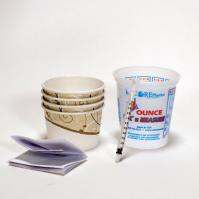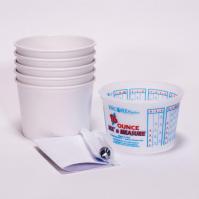Plastic Measuring Containers
Due to our low extra value pricing, extra shipping rates will apply on larger quantities
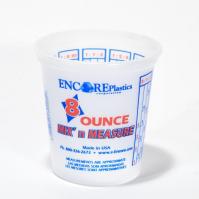
| Quantity | 1 - 9 | 10 - 23 | 24 - 95 | 96+ |
| Price | Can$0.88 | Can$0.82 | Can$0.72 | Can$0.60 |
 Click Picture for more Info
Click Picture for more Info
Mix 2-part Resins or Chemicals by Ratio in the Same Container
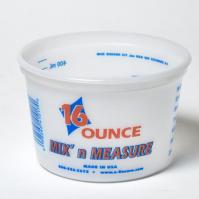
| Quantity | 1 - 9 | 10 - 23 | 24 - 95 | 96+ |
| Price | Can$1.23 | Can$1.15 | Can$1.05 | Can$1.00 |
 Click Picture for more Info
Click Picture for more Info
Mix 2-part Resins by Ratio in Same Container
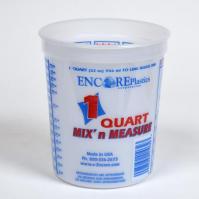
| Quantity | 1 - 9 | 10 - 23 | 24 - 95 | 96+ |
| Price | Can$1.35 | Can$1.30 | Can$1.20 | Can$1.10 |
 Click Picture for more Info
Click Picture for more Info
Mix 2-part Resins by Ratio in Same Container
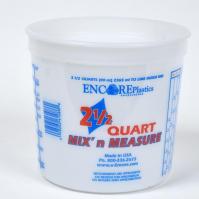
| Quantity | 1 - 9 | 10 - 23 | 24 - 95 | 96+ |
| Price | Can$3.55 | Can$3.44 | Can$3.04 | Can$2.84 |
| Also sold by case 50/Case Sku 66120 | ||||
Click Picture for more Info
Mix 2-part Resins by Ratio in Same Container
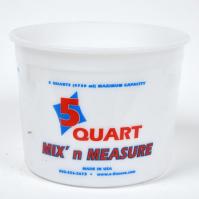
| Quantity | 1 - 9 | 10 - 23 | 24 - 95 | 96+ |
| Price | Can$5.47 | Can$5.30 | Can$5.20 | Can$4.99 |
Click Picture for more Info
Graduated plastic mixing containers are containers made of plastic that include graduated markings or measurements on their sides. These containers are commonly used in laboratories, research facilities, industrial settings, and educational institutions for various purposes, such as accurate measurement, mixing, and dispensing of liquids or powders. The graduated markings on these containers allow for precise volume measurements and facilitate the preparation of solutions or mixtures with specific concentrations.
Here are some key features and uses of graduated plastic mixing containers:
- Measurement Accuracy: Graduated markings are typically in milliliters (mL) or other volume units, allowing users to measure liquids or substances with a high degree of accuracy. This is important in scientific experiments and quality control processes.
- Mixing: These containers are designed for mixing different substances. They often have a wide mouth for easy pouring and stirring, and some may include sealing lids to prevent spillage or contamination during mixing.
- Chemical Resistance: Depending on the type of plastic used, graduated plastic mixing containers can be resistant to various chemicals, making them suitable for a wide range of applications. For particularly aggressive chemicals, containers made from specific plastic materials, such as polypropylene or high-density polyethylene, may be chosen.
- Disposable or Reusable: Graduated plastic containers are available in both disposable and reusable versions. Disposable containers are convenient for one-time use, while reusable containers can be cleaned and sterilized for multiple uses.
- Variety of Sizes: These containers come in various sizes, ranging from small volumes like 50 mL to larger containers with capacities of several liters. This allows users to select the appropriate size for their specific needs.
- Transparent or Translucent: Many graduated plastic mixing containers are made from transparent or translucent plastic, allowing users to easily see the contents and measurement markings.
- Spouts and Handles: Some plastic mixing containers are equipped with spouts and handles for easy pouring and handling, especially when transferring liquids.
- Safety Considerations: When working with potentially hazardous chemicals, it's important to ensure that the plastic used in these containers is compatible with the substances being handled to prevent chemical reactions or leaching.
Graduated plastic mixing containers are versatile tools in various fields, including chemistry, biology, pharmaceuticals, food science, and more. They provide a convenient and cost-effective way to measure, mix, and store liquids and powders accurately, making them an essential component of many laboratory and industrial processes.


